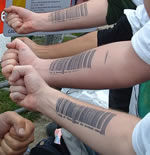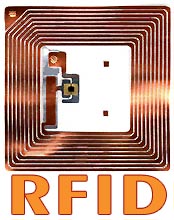- In the United Kingdom, Tony Blair's New Labour government has carried out a campaign pledge to "introduce ID cards, including biometric data like fingerprints, backed up by a national register." Overcoming some reluctance, they rallied their Members of Parliament to strip out a clause in a proposed ID card creation bill that would have made registering for the cards voluntary. Civil libertarians are now pressing the House of Lords to put the clause back in again. Curious Hamster has the story.
- Meanwhile, in the U.S., the NY Times ran an op-ed today by Douglas McGray of the New America Foundation cataloging reasons why a national ID card would be good for liberal policy objectives in health care, voter empowerment, poverty, education, social welfare, and immigration. McGray's arguments are certain to be controversial and mostly seem pretty darn thin -- ID cards are unlikely to end intimidation of racial minority voters, for example. But what seems significant is the publication venue and the "liberal" cast to the argument.
 I first thought about national ID cards in 1994 during the campaign against Prop. 187, California's anti-immigrant initiative. Prop. 187 was going to bring questions of legal identity to the fore in every institution in the state by making hospitals, schools and all state bureaucracies into enforcers of restrictive immigration laws. Many civil liberties groups argued against the initiative because it would require new state ID cards to enforce it. Yet I quickly learned that this argument did not resonate with younger people involved in the campaign. They assumed that national ID cards were inevitable: since the technology existed to track everyone, everyone would be known and everyone would be tracked. Resistance to the ID cards was futile.
I first thought about national ID cards in 1994 during the campaign against Prop. 187, California's anti-immigrant initiative. Prop. 187 was going to bring questions of legal identity to the fore in every institution in the state by making hospitals, schools and all state bureaucracies into enforcers of restrictive immigration laws. Many civil liberties groups argued against the initiative because it would require new state ID cards to enforce it. Yet I quickly learned that this argument did not resonate with younger people involved in the campaign. They assumed that national ID cards were inevitable: since the technology existed to track everyone, everyone would be known and everyone would be tracked. Resistance to the ID cards was futile.This horrifying perspective took awhile to sink in, but it has; I now believe that resistance to erosion of freedoms that counts on maintaining the inefficiencies of a bygone technological era is futile. Ain't gonna happen. We will all eventually switch to the automatic teller, adopt the radio-powered transponder that collects our tolls, browse the information super highway, or choose some other enticing, if intrusive, convenience. If we want to ensure personal liberties, we'll have to do so by creating a political culture that values such liberties, not by hoping "they" can't find us.
Perhaps, ultimately, we'll all just have RFID chips implanted in our bodies. Some workers in Ohio who need access to a particular secure room already do. George Monbiot of the U.K. Guardian paints a picture of future uses of RFIDs:
There's the rub. This stuff creeps in when we let it be used on those who don't have the political power to fight it -- we have to ask ourselves, who's next?The company that makes these "radio frequency identification tags", the VeriChip Corporation, says they "combine access control with the location and protection of individuals". The chips can also be implanted in hospital patients, especially children and people who are mentally ill. When doctors want to know who they are and what their medical history is, they simply scan them in....
[A]nother implantable device emits a signal that allows someone to be found or tracked by satellite. The patent notice says it can be used to locate the victims of kidnapping or people lost in the wilderness. There are, in other words, plenty of legitimate uses for implanted chips. This is why they bother me. A technology whose widespread deployment, if attempted now, would be greeted with horror, will gradually become unremarkable. ...
I don't believe that you or I or most comfortable, mentally competent people will be forced to wear a tag. But it will become an increasingly acceptable means of tracking and identifying people who could be a danger to themselves, or who could be at risk of sudden illness or disappearance, or who are otherwise hard for companies or governments to control. They will, on the whole, be people whose political voice is muted.
 And then, I believe, we can only fight for freedom and privacy by taking our heads out of the sand. There will be ID cards and numerous other intrusions on our property and even our bodies. What will count is whether we can win enough legal safeguards to outlaw their misuse to control anyone. Sure there will be violators of any restrictions, but it is up to us to create a political culture that makes these transgressions deeply taboo.
And then, I believe, we can only fight for freedom and privacy by taking our heads out of the sand. There will be ID cards and numerous other intrusions on our property and even our bodies. What will count is whether we can win enough legal safeguards to outlaw their misuse to control anyone. Sure there will be violators of any restrictions, but it is up to us to create a political culture that makes these transgressions deeply taboo. We are currently seeing how very difficult it will be to put spying and monitoring off limits to the powerful. And technological progress will only make it harder. But, as Carl Schurz, the German immigrant who ended up a Union Army general and U.S. Senator in the late 1900s proclaimed: "If you want to be free, there is but one way; it is to guarantee an equally full measure of liberty to all your neighbors. There is no other." There is no other, indeed.
2 comments:
Thanks for pointing to the Monbiot piece. What most horrified me in the New York Times piece I quoted was the acceptance in Spain and Amsterdam of VeriChips to get into nightclubs more quickly or run a bar tab. It shows how easily this technology will be accepted by people for mere convenience without thought to the loss of personal privacy.
I, also, experience a high level of anxiety that too many people will allow the adoption of VeriChips based on their benefits, without recognition of the opportunity for abuse also present.
I feel a sense of alarm that your experience, about which you write, indicates many of our young people seem so willing to accept whatever technology offers without concern for the rights they are relinquishing.
Why is it so many never appreciate what they've lost until it is gone, possibly irretrievable?
Guess it falls to all of us to keep the conversation on personal privacy central though whatever means we have at our disposal.
Appreciate the opportunity to read you from the link at TGB.
Post a Comment